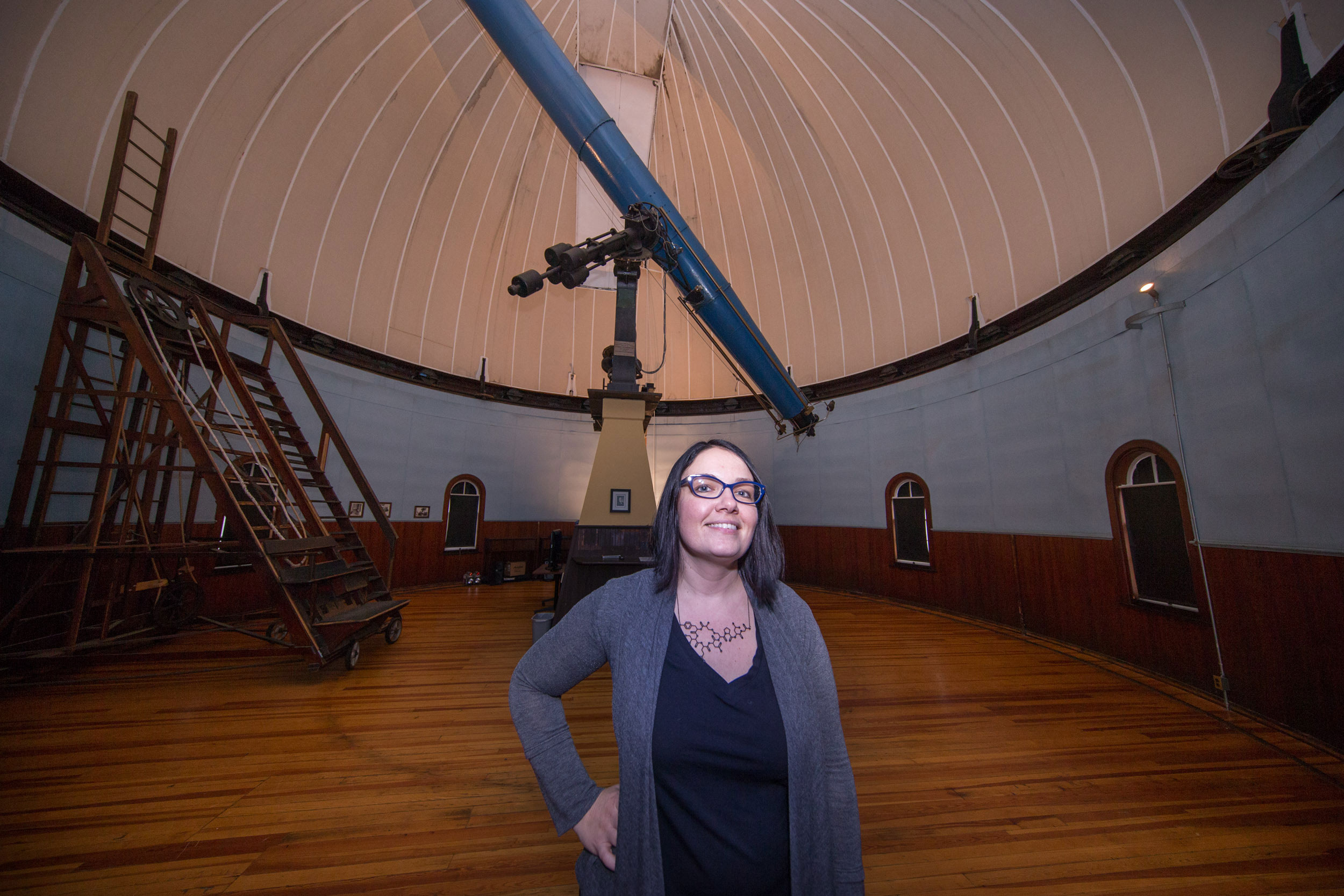Astronomer Sabrina Stierwalt once huddled under a comforter in a cubbyhole closet in a hotel room in Leiden, the Netherlands to record an episode of her popular science podcast, “Everyday Einstein.” She was attempting to eliminate the sound of cars rushing by on the highway outside her window.
The University of Virginia postdoctoral fellow is used to recording her weekly podcast in closets from wherever she might be – at home, at scientific conferences or at astronomical observatories around the world.
“The clothes in the closets help muffle echoes and extraneous sounds,” Stierwalt said.
Still, she occasionally has to re-record parts of her podcast when a dog barks or a horn sounds.
In the year that Stierwalt has served as “Everyday Einstein” for the Macmillan website, “Quick and Dirty Tips,” she has recorded about 50 podcasts on such subjects as weather prediction, the best ways to nap, whether aliens exist, science in the kitchen – you name it, or ask it, and she may try to answer it. Her goal is to “make sense of the science in the everyday.”
“I think it’s very important to promote and improve general scientific literacy,” Stierwalt said. “The podcast even makes me more scientifically literate because I have to become an expert on each topic of the week, whatever it might be.”
She keeps up with science in the news and often picks timely topics from the headlines, such as climate change.
“I try to distill good information from bad, to give listeners good, reliable information that they can trust,” she said. “I really believe that a better understanding of science makes people better citizens, that they gain a better understanding of the world around us and our place in the world. Scientific literacy makes people ask questions, gain answers and challenge assumptions.”
Often Stierwalt will pick a topic out of her own curiosity – something she’s always wondered about and has wanted to better understand. Then she researches each subject before writing and recording podcasts that are heard each week by 150,000 or so fans. She also does shows in answer to questions sent in by her listeners.
This past summer, Scientific American asked her to write a piece on Einstein’s Nobel Prize-winning discovery of the law of the photoelectric effect – the realization that light is both a wave and a particle – which she also turned into a podcast.
She also has interviewed Jon Palfreman, the “NOVA” and “Frontline” producer and author of the bestselling book, “Brainstorms,” as well as “science guy” Bill Nye, about his new climate change book, “Unstoppable.”
Stierwalt frequently does her writing and recording late in the night, when her toddler is asleep. As an astronomer, Stierwalt long ago began staying up through the night while conducting research, which presents challenges in society’s everyday diurnal world. So she was curious about circadian rhythms, and did a podcast on napping.
“It’s not an insignificant amount of work, putting together this podcast each week on deadline,” she said. “I work hard on researching each piece to make sure it is fully accurate, succinct, accessible and interesting.”
The podcast is a part-time job for Stierwalt, who focuses most of her time on research into the formation of small galaxies. She also, this semester, is teaching a general astronomy course – “The Origin of Almost Everything” – for non-science majors. And she has, during her three years at the University, worked as a coordinator and teacher for her department’s Dark Skies, Bright Kids program, which brings hands-on astronomy to rural elementary schools, another effort to improve science literacy.
On Friday, she will host McCormick Observatory’s public night event; her subject is whether or not aliens exist and if there are other worlds like Earth, presenting another opportunity to bring better understanding of science to the public.
Last year Stierwalt was named a L’Oreal USA For Women in Science Fellow – one of only five selected from a national pool of hundreds – for her contributions to science, technology, engineering and mathematics. The award included a $60,000 stipend to support her research and outreach efforts.
Recently Stierwalt accepted a staff scientist position with the National Radio Astronomy Observatory, headquartered in Stone Hall on University Grounds. She begins her work there later in the month, but will continue with UVA as an adjunct astronomy instructor, will serve as a liaison between NRAO and the University’s astronomy department, and will continue her participation in Dark Skies, Bright Kids.
“My time at UVA has been amazing and incredible,” Stierwalt said. “My mentor, astronomy professor Kelsey Johnson, gave me the freedom to develop my research programs and educational outreach opportunities. And I’ve had so many top-notch collaborators here. My fellowship here has prepared me well for my new position at NRAO.”
Media Contact
Article Information
December 3, 2015
/content/everyday-einstein-sabrina-stierwalt-brings-everyday-science-everybody

